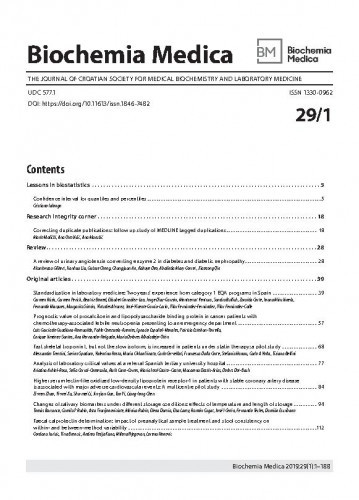Introduction: Standardization is the ability to obtain interchangeable results leading to same medical interpretation. External quality assessment(EQA) is the main support of the on-going harmonization initiatives. Aim of study was to evaluate results obtained from two years category 1 EQAprogram experience in Spain and determine the impact of applying this type of EQA program on the analytical standardization.Materials and methods: According to the analytical method, traceability and instrument different groups were established which results wereevaluated by calculating mean, coefficient of variation and percent of deviation to the reference value. Analytical performance specifications usedto the results' evaluation were derived from biological variation for bias and from the inter-laboratory coefficients of variation found in a previouspilot study.Results: Only creatinine measured by enzymatic methods gave excellent results, although few laboratories used this method. Creatine kinase andGGT gave good precision and bias in all, but one instrument studied. For the remaining analytes (ALT, ALP, AST, bilirubin, calcium, chloride, glucose,magnesium, potassium, sodium, total protein and urate) some improvement is still necessary to achieve satisfactory standardization in our setting.Conclusions: The two years of category 1 EQA program experience in Spain have manifested a lack of standardization of 17 most frequent biochemistrytests used in our laboratories. The impact of the information obtained on the lack of standardization is to recommend abandoning methodssuch as ALT, AST without exogenous pyridoxal phosphate, Jaffe method for creatinine, and do not use non-commutable calibrators, such as aqueoussolutions for calcium and sodium.
Standardization in laboratory medicine : two years’ experience from category 1 EQA programs in Spain / Carmen Ricós, Carmen Perich, Beatriz Boned, Elisabet González-Lao, Jorge Diaz-Garzón, Montserrat Ventura, Sandra Bullich, Zoraida Corte, Joana Minchinela, Fernando Marques, Margarita Simón, Virtudes Alvarez, José-Vicente García-Lario, Pilar Fernández-Fernández, Pilar Fernández-Calle.
Sažetak

 Biochemia medica : the journal of Croatian Society for Medical Biochemistry and Laboratory Medicine : 29,1(2019) / glavna i odgovorna urednica Daria Pašalić.
Biochemia medica : the journal of Croatian Society for Medical Biochemistry and Laboratory Medicine : 29,1(2019) / glavna i odgovorna urednica Daria Pašalić.